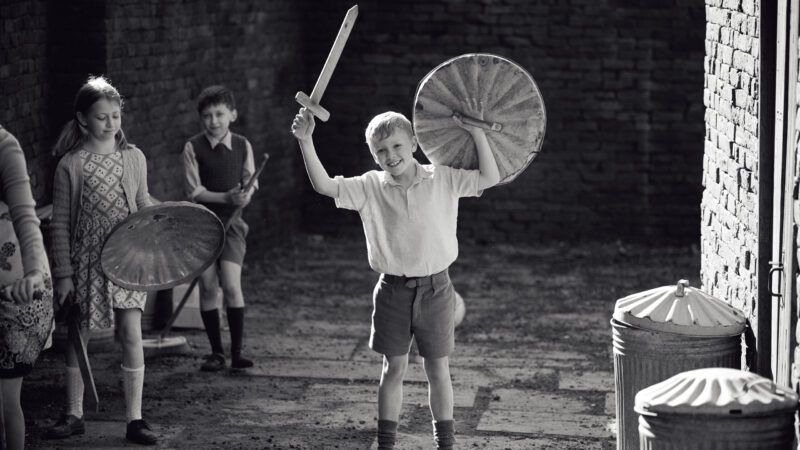Review: Belfast
Hard times.

The time is August of 1969; the place, a mostly Protestant neighborhood in Belfast, the capital of Northern Ireland. There are Catholic families living here, too, but everyone gets along. Then there's an eruption of what will become the 30-year-spasm of Irish sectarian violence called The Troubles—a struggle, roughly, between Protestant unionists and Catholic nationalists for the future of the divided country. This battle has just begun, and now a gang of marauders is suddenly in the streets, throwing rocks and bombs, smashing windows, trashing shops.
We see all of this, and all that follows, through the eyes of a nine-year-old boy called Buddy (precociously charming Jude Hill), a freckle-faced stand-in for Belfast native Kenneth Branagh, who saw it all firsthand back when he was a kid himself and has now written and directed a warm and heartfelt movie about it.
The quiet achievement of Branagh's film is its restraint—he doesn't seem to be settling any long-simmering personal scores. Buddy and his family—mother (a splendid Caitriona Balfe, of Outlander), father (Jamie Dornan, now fully emerged from the Fifty Shades of Grey pictures) and older brother (Lewis McAskie)—are the prism through which we watch the ugliness unfolding all around them. Branagh doesn't play the terrorism here for excitement—we only see the bomb-throwers lurking about the town trying to recruit other men to their cause. "Tell your father I expect to hear from him soon," one of them tells buddy, "or he'll be hearin' from me." Buddy's grandfather (Ciarán Hinds, another Belfast native) counsels extreme caution. "Next time they'll send somebody serious," he says. "Get yourselves to the moon."
Buddy's father (only called Pa in the movie, as his mother is only called Ma) is resistant to the rebels' menacing pressure to join them. What they're really doing is pushing him closer to leaving Ireland, which has the highest unemployment rate in the UK. (He is already compelled to be away from his family for weeks at a time working as a carpenter in England, the nearest place where jobs are available.) His wife is distraught by the idea of leaving Belfast, where she and her husband have spent their entire lives. But he is increasingly determined to escape, and when he returns home from his work sojourns, he brings with him tempting travel brochures for Australia and Canada.
Branagh conveys the terror of the Irish conflagration through pungent details. Buddy is lured into the looting of a Catholic-owned grocery shop by an older gang girl named Moira (Lara McDonnell). When he returns home with a stolen box of laundry soap, his infuriated mother marches him right back to the store to return it to a shelf. She's prevented from doing this, however, by a thug who tells her, "That's not the message we're trying to send." Branagh also contrasts the havoc caused by the grownups in the story with the gentler concerns of childhood: Buddy is infatuated with a girl in his class at school—a little blonde angel named Catherine (Olive Tennant)—and when he announces his ambition to marry her someday, his grandfather offers sweet, if unrealistic, encouragement.
Branagh also weaves in a few subtle personal references. Buddy is a blossoming movie buff—we see him at a theatre with his grandmother (Judi Dench: a Brit, but half-Irish) watching the 1968 fantasy film Chitty Chitty Bang Bang (for which this movie, otherwise rendered in a creamy black and white, briefly turns Technicolor). At another point we see Buddy, also a fan of American comic books, absorbed in a copy of Thor (foreshadowing Branagh's own directorial involvement in the first of Marvel's Thor movies).
With much old and new music by Van Morrison (another Belfaster) floating through the movie's soundtrack, Branagh's picture conveys a compact feeling of time and place without working up too much of a sweat about it. Its main concern is simple and direct: Will Buddy and his family escape the disaster that's engulfing them? We note that Branagh himself managed to make it out.


Show Comments (20)